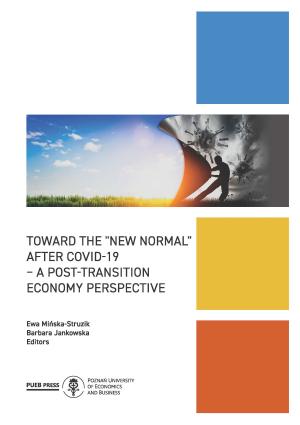Redakcja naukowa
Ewa Mińska-Struzik, Barbara Jankowska
Toward the „new normal” after COVID-19 – a post-transition economy perspective
Dostępność i zakup
Wersja elektroniczna(IBUK)Wersja elektroniczna
(CEEOL)
*Kliknięcie przycisku powoduje przeniesienie na zewnętrzną platformę udostępniania lub sprzedaży.
Książka jest dostępna w subskrypcjach bibliotecznych: Ibuk Libra i EBSCO.
Mińska-Struzik, E. i Jankowska, B. (red.). (2021). Toward the „new normal” after COVID-19 – a post-transition economy perspective. Wydawnictwo Uniwersytetu Ekonomicznego w Poznaniu. https://doi.org/10.18559/978-83-8211-061-6
Foreword
Part I. CHALLENGES AT THE SUPRANATIONAL AND NATIONAL LEVEL
- The economy vs. Covid-19. A macroeconomic approach (Tadeusz Kowalski)
- How Covid-19 impacted the European integration processes? The case of EU Cohesion Policy and budget (Ida Musiałkowska, Piotr Idczak)
- The European Union’s Common Commercial Policy and the Covid-19 pandemic: reactions and challenges (Grzegorz Mazur)
- The future of the European Migration and Asylum Policy (Judyta Cabańska)
- Central Bank policy toward the Covid-19 pandemic: Seeking patterns among the most powerful central banks (Anna Matysek-Jędrych, Katarzyna Mroczek-Dąbrowska)
- International portfolio diversification during the Covid-19 pandemic time: A study of correlations among post-transition and developed CEE countries (Paweł Śliwiński)
- Foreign direct investment and the Covid-19 pandemic: the real economy perspective and theoretical implications (Marian Gorynia, Piotr Trąpczyński)
- The impact of Covid-19 on the finances of multinational enterprises from the perspective of balance of payments transactions (Monika Andrzejczak)
Part II. CHALLENGES FOR BUSINESS SECTORS AND INDUSTRIES
- Internal substitution in the tourism market: Effects of the Covid-19 pandemic (Agnieszka Niezgoda, Ewa Markiewicz, Klaudyna Kowalska)
- The effects of Covid-19 pandemic on sport, video game, and tourism industry: Sentiment analysis of press, Internet articles and Twitter data (Łukasz Bryl, Justyna Majewska, Szymon Truskolaski)
- Goods road transport sector facing pandemic crisis (Piotr Banaszyk, Sylwia Konecka, Anna Maryniak)
- The Polish logistics real estate market as a link in international supply chains the Covid-19 crisis (Waldemar Budner)
- Covid-19 disruption of European agri-food markets: The case of Poland (Magdalena Śliwińska, Rafał Śliwiński)
- Consumer acceptance of AR technology in e-commerce in the light of the Covid-19 pandemic: A conceptual perspective (Małgorzata Bartosik-Purgat, Tomasz Grzegorczyk, Wiktoria Rakowska)
- Challenges for innovation co-operation in the biopharmaceutical industry during the Covid-19 pandemic (Łukasz Puślecki)
Part III. CHALLENGES FOR COMPANIES
- The adoption of Industry 4.0 solutions as a remedy against the pandemic crisis–the case of Polish companies (Barbara Jankowska, Ewa Mińska-Struzik)
- Future competences in times of an economic crisis (Anna Łupicka)
- The impact of the crisis on the maintenance of sustainable development initiatives: A comparative analysis of local and international companies (Łukasz Małys)
- Women’s entrepreneurship in the Covid-19 pandemic crisis (Alicja Hadryś)
- Challenges in the currency derivatives management in the OTC market in Poland during the Covid-19 pandemic (Piotr Wybieralski)
- Donation crowdfunding as a source of relief for small businesses (Marcin Wieczerzycki)
The coronavirus (Covid-19) being a highly transmittable, dangerous and pathogenic viral infection emerged in Wuhan city of China first and later on spread around the world. The outbreak of Covid-19 lead to pandemic.
The pandemic is not new to us but this pandemic has put an extremely severe and strong impact on societies and economies. The sudden attack of Covid-19 and the way it affected human lives and economies manifests the VUCA concept, black swans phenomenon and wildcards’ reality. And the new normal reality that will hopefully emerge and be developed on the foundation of the volatile, uncertain, complex and ambiguous Covid-19 reality, will be challenging. Thus, policymakers, business people and researchers need to discuss and join forces to create the post-covid societies and economies that will respect the broadly understood sustainability priority.
An attempt to join and facilitate the discussion on the causes, impacts, consequences and recovery strategies in the pandemic realm is the presented collection of 21 chapters addressing the challenges for societies, economies and businesses prepared by researchers from the Institute of International Economy and Business at the Poznań University of Economics and Business. The book is divided into three parts. Part one touches the supranational and national level aspects of the Covid-19 pandemic. Part two focuses on business sectors and industries. And part three provides the perspective of companies.
The book presenting diverse impacts and consequences that economies, businesses and companies face in the pandemic period and will cope with in the "new normal" after Covid-19 is to be a voice in discussion on how to create a better world. Covid-19 revealed many weaknesses of the global economy, national economies, business sectors and companies. Nevertheless, it is the turning point and opportunity to use the expertise we got and the post-covid recovery strategies to simultaneously address the climate change, biodiversity loss, growing inequalities, future of work, consumption patterns and the issue of distribution of wealth.
The monograph has been indexed in the Web of Science Book Citation Index.
Rozdziały:

Metadane
- ISBN: 978-83-8211-060-9
- e-ISBN: 978-83-8211-061-6
- DOI: 10.18559/978-83-8211-061-6
- Wydanie: I
- Rok wydania: 2021
- Rok premiery: 2021
- Strony: 271
- Wersja papierowa: miękka okładka
- Wersja elektroniczna: pdf
- Format: B5
- Licencja: open access
COVID-19, economic crisis, European integration, globalization, sustainable development, Central Bank, foreign direct investment, international business, sport, video game market, tourism market, logistics, e-commerce, consumption, Industry 4.0, companies
ostatni tydzień: 32
ostatnie 3 miesiące: 239
ogółem: 2624



 Pełna wersja do pobrania (pdf)
Pełna wersja do pobrania (pdf) Abstract
Abstract